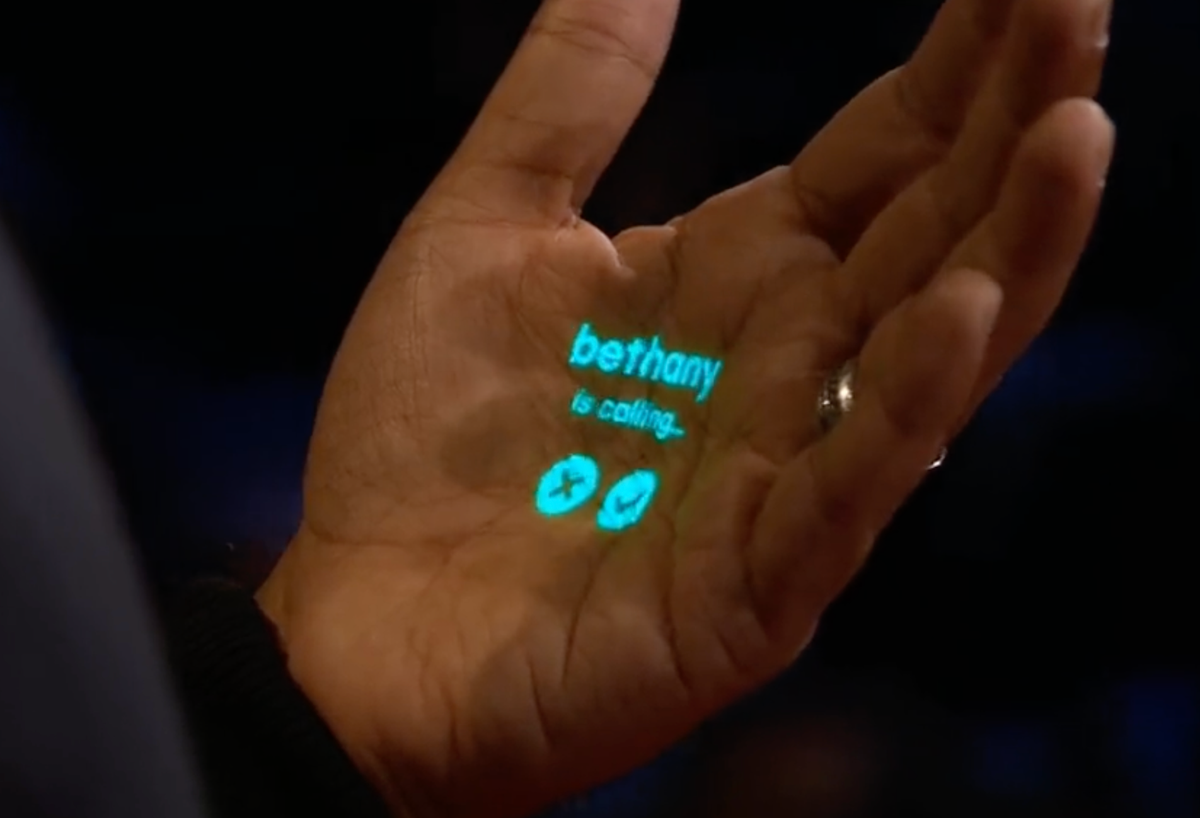Humane wants to beat the smartphone. Can they?
The secretive startup wants us to stop staring at our smartphone screens.

After months of mystery, we finally have our first look at what Humane has been working on. The secretive startup, led by two former Apple employees, was rumored to be working on a device to replace smartphones; something to “put us back in touch with ourselves, each other, and the world around us.”
It’s hard to tell how real the demo is, or know any further context from the limited clips that have leaked. But, from what we can see, Humane’s solution to “freeing” everyone from staring at their smartphone screen is to remove the screen: a small device sits in a pocket, equipped with a microphone and speaker to announce information and a projector that uses your hand as a basic screen when needed.
So, is this the device that “frees” us from our smartphones? John Gruber, as always, has an excellent take on Humane’s unnamed device. This part in particular stood out to me:
The fundamental flaw in Humane’s entire premise, as I see it, is that people don’t feel burdened by their phones. People love them — especially iPhone owners. And those who are ambivalent or even downright antipathetic toward their phones surely aren’t the sort of people who are interested in a newfangled laser-projecting AI-driven chest-badge computer.
I mostly agree with this: my experience is that smartphones are things people love to complain about, but not in an entirely serious way; as Gruber says, people love them too much to get rid of them.
And yet… I can’t help thinking that maybe that’s not the right way to see this. We actually have plenty of evidence that people will give up something they like.
Once upon a time, people loved the BlackBerry. Before that, people loved Nokia phones. I know — I was one of them. I simply couldn’t imagine ever switching away. I had friends in Japan who laughed at the first iPhone because it couldn’t do a fraction of what their NTT DoCoMo i-mode handsets could. (They, like me, are now committed iPhone users.)
Over the years of following tech, one thing I’ve noticed is that people can’t really be trusted to know what they want. The iPod was too big, bulky and expensive compared to flash memory MP3 players — and then it took over the world. The Nintendo Wii was underpowered and dead without HD graphics — it became a global sensation. And few rumors before the iPhone’s announcement pegged it as a touchscreen-only device, because a smartphone without a keyboard just wasn’t seen as viable — not in a technical sense, but by users, who didn’t think it’d work.
The other thing I’ve noticed is that, in our search for the next big thing, we tend to fixate on how products directly stack up in a direct comparison. The reality is that whatever comes next is usually completely different and can’t be judged by the previous standard. The iPhone can technically be dubbed the BlackBerry Killer — but nobody would really call it that, because it isn’t merely a better BlackBerry. Its strengths are entirely different, its value is entirely different. And the same will be true in future: whatever kills the iPhone won’t just be a better iPhone, but something entirely new.
With that in mind, I’m not entirely dismissive of Humane. Don’t get me wrong: I’m still skeptical about the vision and even moreso about the execution, especially given that we haven’t seen the product properly and the demo shows signs that it might have been staged.
So, does that mean they’re on to a winner? Not necessarily, because there was something else that’s long struck me about Humane. It’s something Gruber called out, too, in a tweet by Humane’s co-founder Imran Chaudhri. After LeBron James broke the NBA’s all-time scoring record, someone tweeted a picture of the crowd all holding their phones up to capture the moment. Chaudhri replied: “we all deserve better.”
Do we? Gruber’s argument is that everyone in that shot was delighted to be able to record a historic moment on their phones, and I agree with him. Chaudhri, and Humane, are making something that fits their personal vision of technology and theirs alone.
There is nothing wrong with that. But there’s a fine line between being a visionary — seeing things others can’t — and being blinkered, not seeing that your vision is shared by you and you alone.
Almost exactly 10 years ago, Microsoft unveiled a bold vision for their next game console. The Xbox One’s unveiling was an unqualified disaster, laser-focused on handing Microsoft control of the living room. They told us we could plug our cable boxes into the Xbox One, have Kinect control your devices with IR and show TV listings right on the console — all features that may have worked great in certain parts of the US, but didn’t work at all for anyone else. At one point, a Microsoft executive even showed off how you can use your voice while watching a movie to ask your Xbox to snap an Internet Explorer window to browse the web on your TV right next to the movie, something absolutely nobody would ever do unless they are a Microsoft executive. The entire thing was a fever dream, built entirely around the way people might live in Redmond, Washington — but not for anyone else.
Humane are building a product that they want to use. Does anyone else? Does the wider world agree that technology should take a back seat and the smartphone can be dispensed with? I’m not so sure. But it’ll be fascinating to watch.





